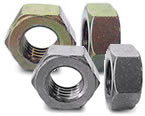
Vibrations aren’t just a nuisance; they can compromise the integrity of fasteners. When exposed to regular vibrations, for instance, nuts may come loose. They may gradually work their way off the bolts or threaded rods with which they are used. You can still use nuts in environments where vibrations occur, but you should take some precautions to ensure they don’t loosen.
#1) Locking Wire
You can use locking wire to protect nuts from vibrations. Also known as safety wire, it works by anchoring nuts and other fasteners in place. Locking wire is available in different materials, with stainless steel being the most common. You can also find it in different sizes. To use locking wire, you’ll need to run it through a hole in the head of each nut or fastener.
#2) Thread-Locking Fluid
Thread-locking fluid offers a simple and effective way to protect nuts from vibrations. It’s a type of adhesive that, when applied to threaded fasteners, locks them in place. Thread-locking fluid was originally developed by Vernon K. Krieble in the 1950s. Since then, many formulas have been released, but most of them are methacrylate-based. As a result, thread-locking fluid reacts to the metal in nuts and other fasteners.
#3) Nyloc Nuts
Rather than using plain nuts, you may want to use nyloc nuts if you’re worried about vibrations. Nyloc nuts feature a threaded interior that allows them to twist onto the end of a bolt or threaded rod. The difference between nyloc nuts and plain nuts, however, is that the former features a nylon collar. This nylon collar creates friction with the bolt’s threads, there holding the nyloc nut in place.
#4) Jam Nuts
In addition to nyloc, there are jam nuts. Both nyloc nuts and jam nuts are classified as lock nuts, meaning they protect against loosening. Jam nuts receive their namesake from their ability to jam against a traditional nut. They are typically slimmer and have a lower profile than traditional nuts. You can use a jam nut by twisting it against a traditional nut.
#5) Lock Washers
Another way to protect nuts from vibrations is to use them in conjunction with lock washers. Washers, of course, are discs that distribute the load of a threaded fastener. Without a washer, the fastener’s load will be concentrated in a small area, which can cause damage to the fastened part. A washer will distribute the fastener’s load across a larger surface area so that damage is less likely to occur. Lock washers also distribute the load of a threaded fastener, but they are designed to lock in place.



